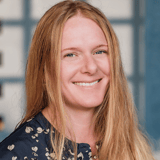Summary
DesignOps takes the lead to author our internal career matrix, so we can objectively and uniformly refresh each discipline, and establish org-wide skills echoed throughout each role. DesignOps at Salesforce is also included within these Career Competencies, allowing for our team to hold more consistent career discussions, and unifying promotions by leveraging the same language when discussing each DesignOps employee. Plus, since DesignOps is seen as a fairly "new" discipline, having it paired alongside more "well-known" disciplines (Designer, UX Engineer), elevates the understanding of our role and skills, and provides a baseline paired alongside our peer's disciplines. There’s great power in language, and the words we choose to use makes an impact. Making conscious efforts on our word choices and communications with one another can affect change at both the individual level as well as team-wide.
Key Insights
-
•
Salesforce’s UX career ladder includes about 180 unique skill attributes for design roles spanning six levels.
-
•
The team deliberately replaced vague terms like soft skills with clear, actionable language such as active listening.
-
•
Removing gender-coded language helped create more equitable and appealing career progression criteria.
-
•
Relationship design, a new DEI skill category, was added for all UX disciplines to highlight how work is done, not just what is done.
-
•
Relationship design consists of four interconnected mindsets: courage, compassion, intention, and reciprocity.
-
•
Senior UX employees are expected to hold difficult conversations, mentor others, and recognize power dynamics as part of relationship design.
-
•
The career competencies are tools for conversation, not strict checklists for promotion or scoring.
-
•
The competency updates were achieved over three years through an iterative and collaborative process involving volunteers across disciplines.
-
•
Education and adoption relied on resource guides, live walkthroughs, manager panels, and repeated organizational communication.
-
•
Salesforce’s UX career competencies map to broader company-wide competencies but remain tailored for UX-specific roles.
Notable Quotes
"Soft skills doesn’t always represent active listening, so we updated to be more specific."
"We wanted to be aware of extraversion, so words like energy were changed to initiative to not favor personality types."
"Gender-coded words influence someone’s decision to apply and feel they belong even within internal career ladders."
"Relationship design is not just what you do but how you do it, focusing on building relationships with customers, employees, and community."
"For early career UXers, compassion could be as simple as expressing gratitude for help."
"Senior employees should hold difficult conversations questioning processes that may be harmful to others."
"This is not a checklist or promotion tool; you don’t have to excel in everything to grow."
"If something was unclear or uncomfortable to even one person, it was a sign it needed editing."
"The competencies allow managers to celebrate individualism while maintaining consistency across teams."
"Adding inclusivity to the career ladder took three years and this is still a living document with room for change."
Or choose a question:
















More Videos

"Valuable research becomes buried in overflowing Slack channels with meaty decks no one has time to read or revisit later."
Molly FargotsteinMultipurpose Communication & UX Research Marketing
September 12, 2019

"Standalone insights destroy the researcher’s ability to storytelling and engagement."
Matt DuignanAtomizing Research: Trend or Trap
March 30, 2020

"Community is not a monolith; we must engage a broad intersection of voices, not just one perspective."
Amy Paris Danielle ThierryDelivering Equity: Government Services for All Ages, Languages, Sexual Orientations, and Gender Identities
December 9, 2021

"If you don’t have the time and organizational support, don’t do it because you only set a precedent of failure."
Sofia QuinteroBeyond Tools: The Messy Business of Implementing Research Repositories
March 10, 2022

"When we have genuine relationships and we trust each other, it leads to so much goodness."
Dorelle RabinowitzThe Magic Word is Trust
June 15, 2018

"Stop trying to make your weaknesses a strength, just minimize weaknesses and maximize your strengths."
Greg PetroffDesign is the Differentiator: Bringing New Design Innovations to a Very Antiquated and Very Large Industry
June 9, 2021

"Every innovation carries responsibility; we must tread carefully with AI in health."
Vincent BrathwaiteOpener: Past, Present, and Future—Closing the Racial Divide in Design Teams
October 22, 2020

"If you can draw that picture and tell that story, it just makes it easier for everybody to talk about how it's really going to be used."
Sarah FlamionComplex Problem? Add Clarity by Combining Research and Systems Thinking
March 31, 2020

"We created a collaborative intake where we work together to understand what’s the most important thing."
Carla Casariego Sarah SpencerDesignOps in Wonderland
October 24, 2019
















